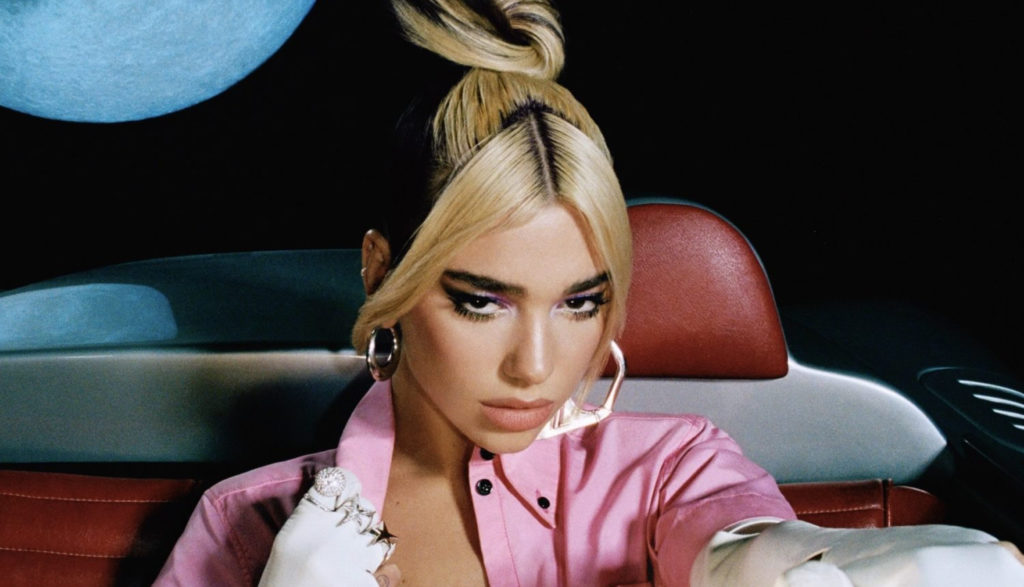
Sometimes it can take a while for breakout artists to find their identity. Interestingly, that is not the case for ascendant pop star Dua Lipa. Following the release of her first full album in 2017, Lipa immediately received critical acclaim as her self-titled debut album topped the global charts en route to setting several international records.
Lipa’s widespread success led to multiple collaborations with artists such as Calvin Harris, Mark Ronson, and Diplo. Her versatility in the ever-widening genre of pop music reflects the genre-hopping DNA of the industry’s upcoming stars. Her discography is a pastiche of diverse pop influences, and her new album, Future Nostalgia, is no different.
This time around, Lipa sticks to disco-influenced beats and dance-club bravado. However, her post-breakup sing-alongs occasionally touch on social issues and gender equality. Future Nostalgia also doubles down on unabashed know-your-worth anthems, while remaining more concerned with passion on the dance floor and in bed rather than what happens when the sun rises.
Anchored by the album’s lead single “Don’t Start Now,” Lipa’s tracks fixate on romantic dynamics. This song shows how she has moved on from “the guy who tried to/Hurt me with the word goodbye.” And she wants to make it clear that she is “better on the other side.” Lipa follows suit on “Love Again” by singing, “I never thought that I would find a way out/I never thought I’d hear my heart beat so loud.” Yet it seems she does find a way out (albeit via a route that immediately leads to another relationship again).
Lipa explores this conundrum on “Break My Heart”: “Had to get it wrong to know just what I like/Now I’m falling [in love].” At this point, there has been clear difficulty in Lipa’s love life. She knows she’s gotten it wrong and that she’s prone to falling in love again and again and again.
The closing track, “Boys Will Be Boys,” features Lipa singing about gender equality. She highlights the lengths women often go to “hide our figures/doing anything to shut them out/We smile, a way to ease the tension.” Lipa’s message unearths a few stereotypes and hurtful judgements often perpetuated by ingrained biases. It’s a helpful sentiment, yet it becomes potentially misguided as Lipa focuses on a man’s fatal flaws more than seeking peace.
More often than not, Lipa finds herself moving in and out of pre- and post-breakup status, which leads to half-baked reflections about what really went wrong. (On “Break My Heart,” for instance, Lipa’s growing self-awareness about her unhealthy relationship patterns is ultimately undermined by her stubborn refusal to change her ways.) Elsewhere, Lipa turns to sarcastic threats and risque late-night excursions to show the guy how OK she really is.
In “Cool,” Lipa boasts that her love “got the heat and the thrill/gives you more than any pill.” She goes on to let us know exactly what “heat and thrill” means in singing: “I like us better when we’re intertwined/The way you touch me got me losing my senses.” The track “Hallucinate” continues to compare love to a drug with the line “No, I could never have too much/I’ll breathe you in, forever and ever/Hallucinate.”
“Good in Bed” reinforces the idea that sex is the cure to all relational issues: “We drive each other mad/It might be kinda sad/But I think that’s what makes us good in bed.” The song also alludes to oral sex and profanely praises the couple’s physical chemistry.
Lipa repeats the phrase “pretty please” numerous times on the song of the same name in an attempt to coax a lover into satisfying her sexual appetite. Even though she might be stressed out by relational strain, she’s again convinced the antidote is more sex, especially because “you’re here now and you’re turning me on.”
“Physical” likewise makes Lipa’s carnal ambitions abundantly clear.
The final song, “Boys Will Be Boys,” contains the repeated lyric, “Boys will be, boys will be boys/But girls will be women.” Lipa insinuates that while boys will remain childish, women are exclusively capable of maturation. Then she sticks it to the listener, singing, “If you’re offended by this song, you’re clearly doing something wrong.”
Boasting sleek, disco beats engineered for TikTok and Instagram stories, Dua Lipa has cemented herself as an international pop star. Many have also praised her for pumping out relatable post-breakup anthems. Combine those two factors, and Lipa’s accumulation of records and acclaim is no surprise.
Some of her songs on Future Nostalgia admirably illustrate how to move on from abusive and toxic relationships. More often, though, Dua Lipa fundamentally links relationship success to physical compatibility and sex.
